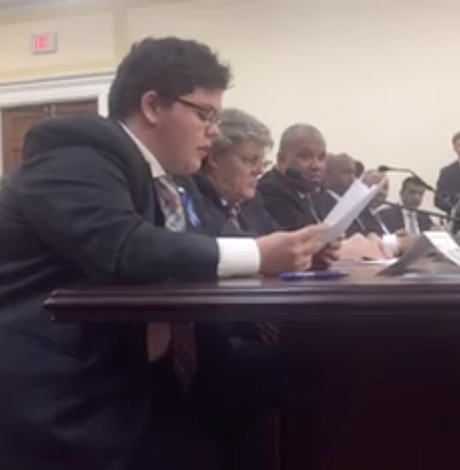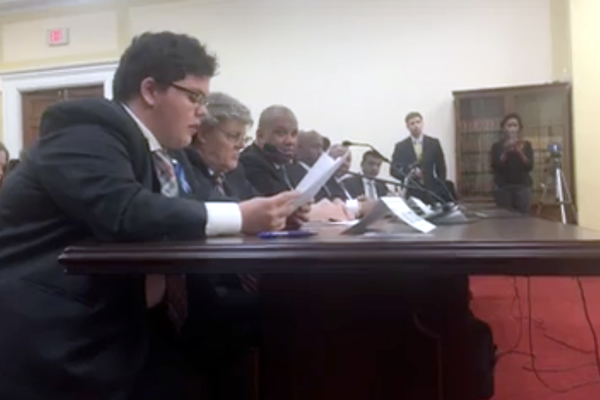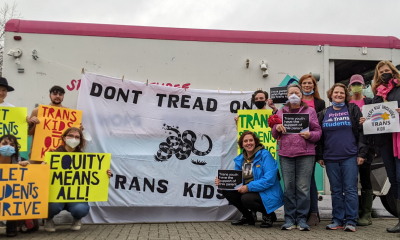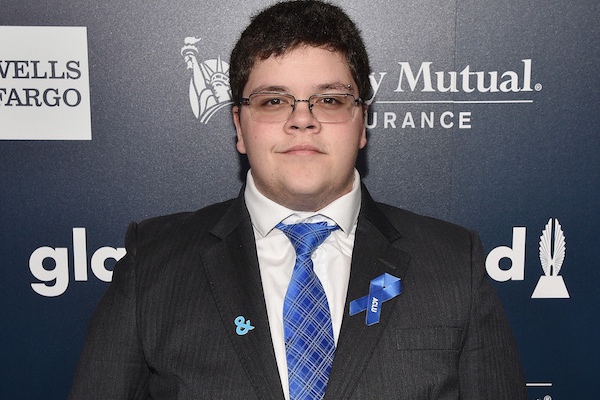News
Gavin Grimm testifies on civil rights after 100 days of Trump
Panel witness decry review of consent decrees, voter ID laws


Gavin Grimm testifies before Congress on April 6, 2017. (Screen capture courtesy Washington Blade Facebook)
Transgender student Gavin Grimm testified before Congress Thursday on the experience of his Virginia high school denying him access to the bathroom consistent with the gender identity as well as harms the Trump administration’s withdrawal of pro-trans guidance has caused for transgender people.
Gavin made the remarks during a congressional forum hosted by U.S. House Democrats on the state of civil rights after the first 100 days of the Trump administration. Witnesseses sharply criticized the Trump administration — in particular the U.S. Justice Department under U.S. Attorney General Jeff Sessions — for failing to live up to equal protection under the law.
Currently suing his school for bathroom access in a lawsuit the U.S. Supreme Court was once poised to consider, but later rejected, Gavin recalled the pain he felt during hearings in which the Gloucester County School Board decided to refuse to treat him consistent with his gender identity.
“World had spread throughout the community, and people turned up in droves,” Gavin said. “After each frenzied remark, clapping and hollering reverberated throughout the room. I sat while people called me a freak. I sat while my community got together to banish a child from public life for the crime of harming no one. I sat while my school board voted to banish me to retrofitted broom closets or the nurse’s room.”
As Gavin narrated his story, the microphone system for the room in the Rayburm House Office Building cut out, prompting one forum participant to quip, “The Democrats do not control this room.” Invited by Rep. John Conyers (D-Mich.), who was chairing the forum, to speak closer to the dais from a podium, Gavin continued his story.
Recalling the pledge from the White House that President Trump would be “respectful and supportive of LGBTQ rights,” Gavin said the administration’s decision to nix Obama-era guidance assuring transgender kids bathroom access in accordance with their gender identity “could not have been more damaging for trans youth.”
“The guidance had a very simple message: Treat trans students with dignity and respect them for who they are,” Gavin said. “Treating trans students with dignity and respect should not be controversial. The decision to withdraw the guidance sent a terrible message to some of the most vulnerable people that President Trump – the leader of our country – and his administration do not care about protecting you from discrimination.”
After Gavin completed his testimony, attendees at the forum clapped for a lengthy amount of time. Conyers commended him, saying he’s a “courageous young man and you deserve our support and applause.”
Catherine Lhamon, chair of the U.S. Commission on Civil Rights and former assistant secretary for civil rights at the Education Department under the Obama administration, made the transgender guidance rollback a major point of concern during testimony in which she said civil rights under the Trump administration has been “horrendous.”
“It will not surprise this body that that withdrawal offended me because I signed that guidance when I was assistant secretary of civil rights,” Lhamon said.
Lhamon called Trump administration claims the guidance was withdrawn because of improper procedure and incorrect interpretation of Title IX of the Education Amendments of 1972 “categorically untrue,” citing “the many years that all the relevant agencies” spent investigating the facts and speaking the school administrators.
“To think more that whether a federal law that Congress wrote that says explicitly that no person in the United States shall be subject to sex discrimination in school applies to transgender students questions the very humanity of transgender students,” Lhamon said.
Lhamon also took issue with the appointment of Roger Severino, a former researcher for the anti-LGBT Heritage Foundation, to the role of assistant secretary for civil rights at the Department of Health & Human Services. Once in the position of being critical of the Obama administration’s efforts to ensure transgender people have access to transition-related care, Severino will now be charged with protecting transgender people in health care.
“I will never forget how I heard from former HHS civil rights director about a case in which emergency medical professionals refused to treat a transgender women because she is transgender,” Lhamon said. “She later died, although she had a better than 35 percent of survival had she received appropriate and timely medical care. It should go without saying that the director of HHS civil rights should be committed to ensure the fair medical treatment for all persons, regardless of identity status.”
The issue of transgender rights was but one issue before the forum that sought to address the multitude of challenges the civil rights community after 100 days of the Trump administration.
Conyers, the top Democrat on the House Judiciary Committee, expressed a dismal view of the current state of civil rights as he chaired the forum, referencing a “documented loss in the overall climate of equality” and rise in hate violence since the 2016 election.
“Minority communities have been justifiably concerned about the continued role of the federal government in protecting civil rights,” Conyers said. “The Trump presidential campaign promised meaningful changes that would benefit minorities in the area of crime, equal justice and economic equality, his political allies and surrogates to the media have sent a different message that served to heighten national divisions and anxiety.”
DOJ criticized for consent decree review
A central issue was the decision this week of U.S. Attorney General Jeff Sessions to review the consent decrees the U.S. Justice Department had arranged with police departments after patterns of unconstitutional racial discrimination and excessive force, including the shootings of black men.
Chiraag Bains, senior fellow at Harvard Law School Criminal Justice Policy Program and former senior counsel to the assistant attorney general for civil rights under President Obama, cited the review as evidence the Justice Department has been “predictably disastrous” on civil rights.
“This administration insists that policing is a purely local matter into which the federal government should not intrude,” Bains said. “But we’re not talking about a federal takeover of these departments. We’re talking about the enforcement and protection of constitutional rights. There is no federalism problem.”
Ron Davis, former director of the Office of Community Oriented Policing Services at the Justice Department, invoked the words of 19th Century British statesman Robert Peel to describe the appropriate relationship between the police and communities as defined under the consent decrees.
“People comply with the law not because of they are afraid of the police, they comply with the law because they believes the law is fair, just and will be enforced appropriately and without bias,” David said. “People should be afraid of police. They should not have to run from them because they’re going to be deported or think that every infraction will result in arrest.”
But Sessions’ order to review the consent decrees was but one issue to witnesses pointed as evidence the Trump administration was failing to live up to responsibilities on civil rights.
Joe Rich, co-director of the Fair Housing & Community Development Project, raised as a civil rights issue the rollback of voter access to the polls, including early voting cutbacks and the imposition of state voter ID laws.
Although defenders of those laws say they’re intended to prevent voter fraud, Rich said that’s “very rare,” citing a recent study that found the incident rate of voter fraud ranges between .003 percent and .0025 percent.
“Given this tiny incident rate for voter impersonation, the report concluded that is more likely that an American will be struck by lightning than he will impersonate voter at the poll,” Rich said.
Rich said the Justice Department had “vigorously prosecuted” against the voter ID law in Texas for three years, but the U.S. government has “reversed course” with Sessions at the helm in “an action of great concern for all of us doing voting rights work.”
Roy Austin, former director of the White House Office of Urban Affairs, Justice & Opportunity under the Obama administration, took particular issue with the travel ban Trump signed barring immigration into the United States from six Muslim countries, calling it an attempt to “legalize discrimination against an entire faith.”
Although the administration billed the measure as an means to keep potential terrorists from the United States, Auston said “state-endorsed discrimination diminishes public safety.”
“In my humble opinion, this greatest current threat to civil rights in this great nation is this current administration,” Austin said. “In record time, the current administration has already shown not simply a willingness to not defend civil rights, but a shown an intent to violate civil rights, and, at a minimum, with an intent to make it easier for others to violate civil rights.”
Chief Hassan Aden, a member of the steering committee for Law Enforcement Leaders to Reduce Crime and Incarceration and former chief of police of the Greenville Police Department, took issue with greater authority of U.S. Customs & Border Protection to detain travelers entering the United States.
“What’s happening now is there’s sort of this second-class of American citizen being built out, and it involves names and religious preferences, and it’s something that we all need to resist and work against,” Aden said.
Aden recalled his own experienced this year being detained by CBP at JFK International Airport upon re-entry into the United States, which attributed to his Muslim-sounding name. Aden said this incident stands out because he travelled internationally in years past, including five times last year, without issue.
“My name being Hassan Aden, I think, set off a flag,” Aden said. “I utilized my platform and my reach to highlight this issue and give it a voice. There are so many people that this happens to. My detention was 90 minutes. There are people whose detention is significantly longer.”
Rep. Sheila Jackson Lee (D-Texas) held nothing back in her assessment of Trump on civil rights in the wake of the Justice Department reviewing consent decrees with police departments.
“This may be the Armageddon,” Lee said. “We may be seeing the most dangerous Department of Justice that we have seen in decades. I don’t think it is hyperbole; I don’t think it’s hysteria.”
Referencing the plight Gavin continues to face by being denied bathroom access in his school, Lee assured him, “You are not alone. We know the decision of the Supreme Court, but we’re not finished with bringing you relief.”
Other lawmakers present at the hearing were Rep. Bobby Scott (D-Va.), top Democrat for the House Committee on Education and the Workforce; Rep. Cedric Richmond (D-La.), chair of the Congressional Black Caucus; and Rep. Eddie Bernice Johnson (D-Texas).
At the end of the hearing, Lee asked Gavin for his thoughts on the impact of the Justice Department taking an ideological position against transgender rights, which Gavin would only be harmful.
“We see a very real and immediate negative impact on those communities,” Gavin said. “The transgender community is uniquely vulnerable already in that we have less legal protection, we have a higher rate of hate crimes, mental illness, homelessness, unemployment, and then to have a complete and total lack of administrative support, and, in fact, a presence of a administrative intimidation or disregard, the effects of such a negative message across the board would be absolutely devastating.”
National
Supreme Court deals blow to trans student privacy protections
Under this ruling, parents are entitled to be informed about their children’s gender identity at school, regardless of state protections for student privacy.

The Supreme Court on Monday blocked a California policy that allowed teachers to withhold information about a student’s gender identity from their parents.
The policy had permitted California students to explore their gender identity at school without that information automatically being disclosed to their parents. Now, educators in the state will be required to inform parents about developments related to a student’s gender identity, depending on how the case proceeds in lower courts.
The case involves two sets of parents — identified in court filings as John and Jane Poe and John and Jane Doe — both of which say their daughters began identifying as boys at school without their knowledge, citing religious objections to gender transitioning.
The Poes say they only learned about their daughter’s gender dysphoria after she attempted suicide in eighth grade and was hospitalized. After treatment for the attempt and after being returned to school the following year, teachers continued using a male name and pronouns despite the parents’ objections, citing California law. The Poes have since placed their daughter in therapy and psychiatric care.
Similarly, the Does say their daughter has intermittently identified as a boy since fifth grade, but while their daughter was in seventh grade, they confronted school administrators over concerns that staff were using a male name and pronouns without informing them. The principal told them state law barred disclosure without the child’s consent.
Both sets of parents filed lawsuits in the U.S. District Court for the Southern District of California challenging the state policy that protects students’ gender identity and limits when schools can disclose that information to parents.
The justices voted along ideological lines, with the court’s six conservative members in the majority and the three liberal justices dissenting.
“We conclude that the parents who seek religious exemptions are likely to succeed on the merits of their Free Exercise Clause claim,” the court said in an unsigned order. “The parents who assert a free exercise claim have sincere religious beliefs about sex and gender, and they feel a religious obligation to raise their children in accordance with those beliefs. California’s policies violate those beliefs.”
In dissent, the three liberal justices argued that the case is still working its way through the lower courts and that there was no need for the high court to intervene at this stage. Justice Elena Kagan wrote, “If nothing else, this Court owes it to a sovereign State to avoid throwing over its policies in a slapdash way, if the Court can provide normal procedures. And throwing over a State’s policy is what the Court does today.”
Conservative Justices Samuel Alito and Clarence Thomas indicated they would have gone further and granted broader relief to the parents and teachers challenging the policy.
The emergency appeal from a group of teachers and parents in California followed a decision from the United States Court of Appeals for the Ninth Circuit that allowed the state’s policy to remain in effect. The appeals court had paused an order from U.S. District Judge Roger Benitez — who was nominated by George W. Bush — that sided with the parents and teachers and put the policy on hold.
The legal challenge was backed by the Thomas More Society, which relied heavily on a decision last year in which the court’s conservative majority sided with a group of religious parents seeking to opt their elementary school children out of engaging with LGBTQ-themed books in the classroom.
California Attorney General Rob Bonta expressed disappointment with the ruling. “We remain committed to ensuring a safe, welcoming school environment for all students while respecting the crucial role parents play in students’ lives,” his office said in a statement.
The decision comes as the Trump administration has taken a hardline approach to transgender rights. During his State of the Union address last week, President Donald Trump referenced Sage Blair, who previously identified as transgender and later detransitioned, describing Blair’s experience transitioning in a public school. According to the president, school employees supported Blair’s chosen gender identity and did not initially inform Blair’s parents.

Last year, the court upheld Tennessee’s ban on gender-affirming medical care for transgender minors and has allowed enforcement of a policy barring transgender people from serving in the military to continue during Trump’s second term.
District of Columbia
D.C. Black Pride theme, performers announced at ‘Speakeasy’
Durand Bernarr to headline 2026 programming

The Center for Black Equity held its 2026 DC Black Pride Theme Reveal event at Union Stage on Monday. The evening, a “Speakeasy Happy Hour,” was hosted by Anthony Oakes and featured performances by Lolita Leopard and Keith Angelo. The Center for Black Equity organizes DC Black Pride.
Kenya Hutton, Center for Black Equity president and CEO, spoke following the performances by Leopard and Angelo. Hutton announced this year’s theme for DC Black Pride: “New Black Renaissance.”
Performers for 2026 DC Black Pride were announced to be Bang Garcon, Be Steadwell, Jay Columbus, Bennu Byrd, Rue Pratt and Akeem Woods.
Singer-songwriter Durand Bernarr was announced as the headliner for the 2026 festivities. Bernerr gave brief remarks through a video played on the screen at the stage.
DC Black Pride is scheduled for May 22-25. For more information on DC Black Pride, visit dcblackpride.org.
Virginia
Arlington LGBTQ bar Freddie’s celebrates 25th anniversary
Owner asks public to support D.C.-area gay bars

An overflowing crowd turned out Sunday night, March 1, for the 25th anniversary celebration of Freddie’s Beach Bar, the LGBTQ bar and restaurant located in the Crystal City section of Arlington, Va.
The celebration began as longtime patrons sitting at tables and at the bar ordered drinks, snacks, and full meals as several of Freddie’s well-known drag queens performed on a decorated stage.
Roland Watkins, an official with Equality NoVa, an LGBTQ advocacy organization based in the Northern Virginia areas of Arlington, Alexandria, and Fairfax County, next told the gathering about the history of Freddie’s Beach Bar and the role he said that owner Freddie Lutz has played in broadening the bar’s role into a community gathering place.
“Twenty-five years ago, opening a gay bar in Arlington was not a given,” Watkins told the crowd from the stage. “It took courage, convincing, and a deep belief that our community belongs openly, visibly, and proudly,” he said. “And that belief came from Freddie.”
Watkins and others familiar with Freddie’s noted that under Lutz’s leadership and support from his staff, Freddie’s provided support and a gathering place for LGBTQ organizations and a place where Virginia elected officials, and candidates running for public office, came to express their support for the LGBTQ community.
“Over the past 25 years, Freddie’s has become more than a bar,” Watkins said. “It has become a community maker.”
Lutz, who spoke next, said he was moved by the outpouring of support from long-time customers. “Thank you all so much for coming tonight and thank you all so much for your support over the past 25 years,” he said. “I can’t tell you how much that means to me and how much it’s kept me going.”
But Lutz then said Freddie’s, like many other D.C. area gay bars, continues to face economic hard times that he said began during the COVID pandemic. He noted that fewer customers are coming to Freddie’s in recent years, with a significant drop in patronage for his once lucrative weekend buffet brunches.
“So, I don’t want to be the daddy downer on my 25-year anniversary,” he said. “But this was actually the worst year we’ve ever had,” he added. “And I guess what I’m asking is please help us out. Not just me, but all the gay bars in the area.” He added, “I’m reaching out and I’m appealing to you not to forget the gay bars.”
Lutz received loud, prolonged applause, with many customers hugging him as he walked off the stage.
-

 India5 days ago
India5 days agoActivists push for better counting of transgender Indians in 2026 Census
-

 Advice5 days ago
Advice5 days agoDry January has isolated me from my friends
-

 District of Columbia5 days ago
District of Columbia5 days agoCapital Pride reveals 2026 theme
-

 National4 days ago
National4 days agoAfter layoffs at Advocate, parent company acquires ‘Them’ from Conde Nast



















